Key takeaways:
- Reparations politics involves acknowledging historical injustices and restoring dignity, beyond just financial compensation.
- Community dialogues foster empathy and understanding, vital for exploring diverse perspectives on reparations.
- Facilitating discussions requires active listening and vulnerability, allowing for transformative conversations that build connections.
- Future reparations advocacy must focus on coalition-building, educational initiatives, and establishing measurable benchmarks for success.

Understanding reparations politics
Reparations politics is a complex and often contentious subject that revolves around the compensation for injustices committed against marginalized communities, particularly those affected by slavery and systemic discrimination. From my experience in community dialogues, I’ve seen how deeply people feel about the history of these injustices, reflecting a collective yearning for acknowledgment and healing. When you think about reparations, what emotions does it stir in you?
Understanding reparations requires delving into historical truths and recognizing the long-lasting impacts of past wrongs. I remember attending a local workshop where participants shared their family’s stories, revealing the multi-generational trauma caused by systemic disenfranchisement. It became clear that reparations are not just about financial restitution; they’re about restoring dignity and addressing inequality at its roots.
Moreover, engaging with reparations politics means exploring various forms these reparations might take—be it monetary compensation, educational initiatives, or even policy changes. During community meetings, I often ask, “What does justice look like for you?” This question sparks profound discussions, highlighting the diverse perspectives surrounding reparations and reminding us that there’s no one-size-fits-all solution. It emphasizes that our paths toward reconciliation must be as varied as the experiences of the individuals affected.
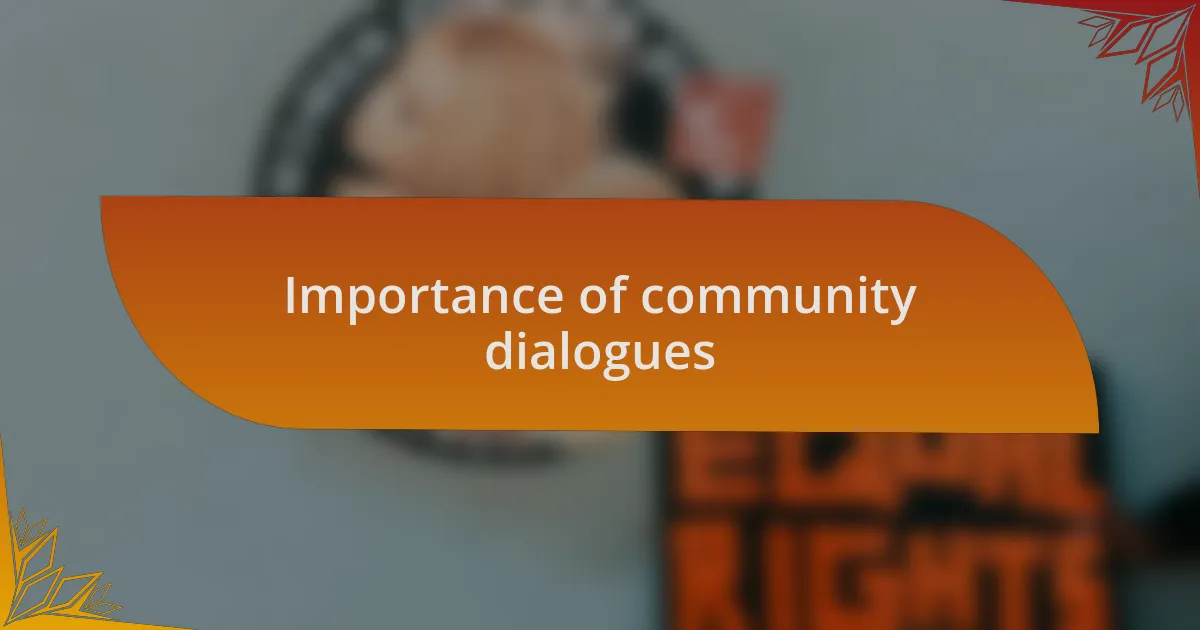
Importance of community dialogues
Community dialogues play a pivotal role in bridging gaps between different voices and experiences regarding reparations. I recall a particularly enlightening discussion where a young activist shared her family’s history of discrimination, causing a ripple effect of vulnerability and openness among participants. It was a reminder that these dialogues allow individuals to express their emotions and connect on a deeper level, fostering understanding in ways that statistics alone cannot achieve.
The emotional resonance of community dialogues cannot be overstated. I often find that when people openly share their stories, it creates a powerful moment of empathy—hearing someone voice their pain or triumph often prompts others to reflect on their own experiences. Isn’t it fascinating how sharing our narratives can cultivate a sense of togetherness, even among those from vastly different backgrounds?
Additionally, these conversations spark important questions around what reparations truly mean in a community context. In one meeting, a participant articulated, “What if reparations started with listening?” This inquiry led us to explore not only the concept of compensation but also the fundamental need for acknowledgment and respect. Such moments illustrate that community dialogues serve as fertile ground for cultivating not just ideas, but actionable pathways towards healing and justice.
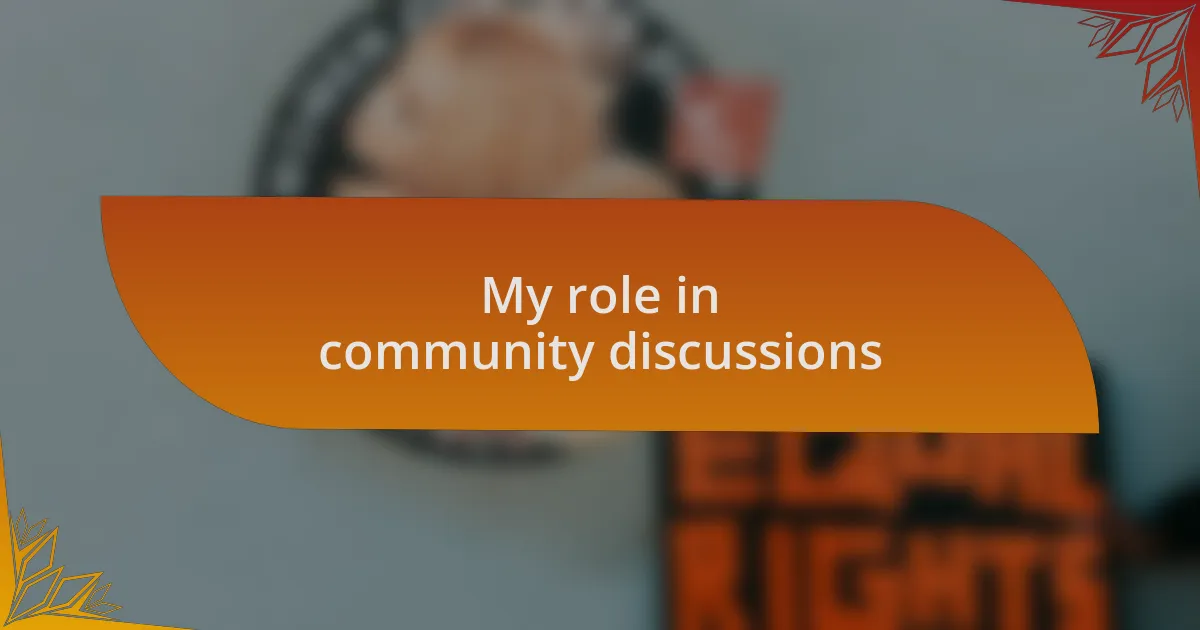
My role in community discussions
In my experience participating in community discussions, I often find myself in a role that encourages active listening. There was one evening where I sat in a circle, absorbing diverse perspectives, and I felt an overwhelming sense of responsibility to ensure every voice was acknowledged. It struck me that truly hearing someone can sometimes be more impactful than offering solutions; it empowers individuals and infuses our conversations with authenticity.
As I engage with my community, I sometimes take on the role of a facilitator. During one session, I guided participants through a process of sharing not just their experiences, but also their hopes for reparations. It was heartwarming to witness how a simple question—“What does justice look like for you?”—opened floodgates of imagination and aspirations, making our dialogue richer. This exchange reinforced my belief that conversations can be transformative, offering a chance to envision a future where we all thrive together.
There are moments in these discussions when I realize my role extends beyond just participation; it feels like I’m part of something sacred. I remember when a participant broke down while discussing their family’s struggles. In that moment, I felt an urgent wave of empathy, compelling me to not only support them but to encourage the group to reflect on how our collective history shapes our current realities. Isn’t it amazing how sharing such vulnerability creates a sense of unity, reminding us that we are all in this together?
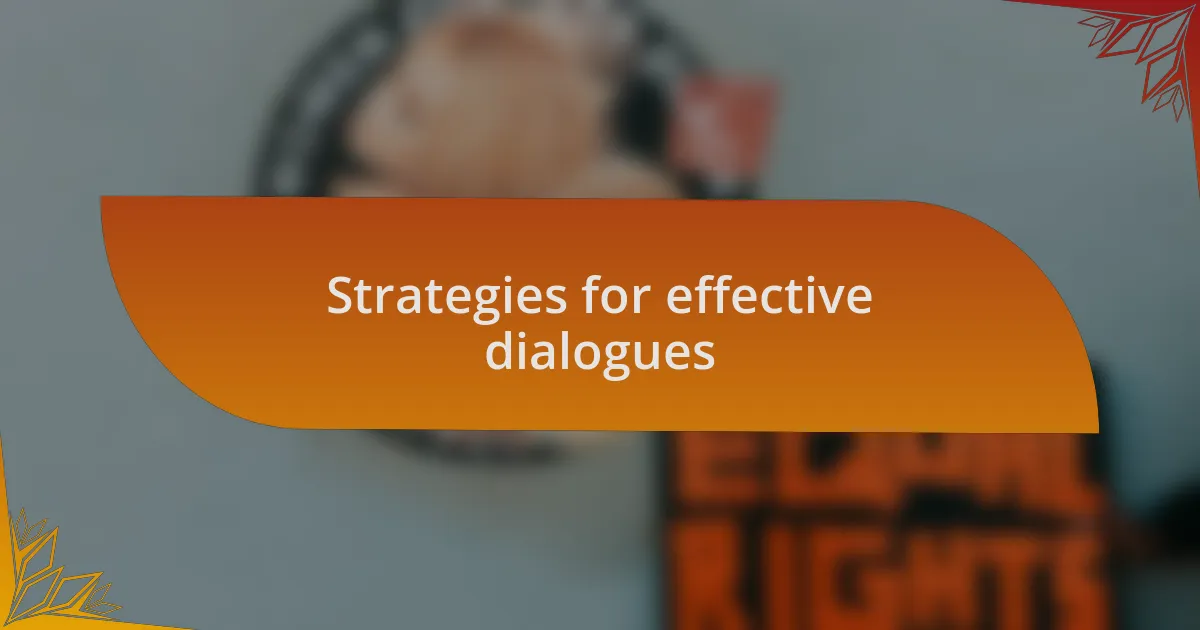
Strategies for effective dialogues
Effective dialogues thrive on transparency and honesty. In one discussion I facilitated, I encouraged participants to express not just their thoughts, but their emotions tied to those thoughts. It was striking to see how sharing personal stories such as my own grappling with the concept of reparations created a trustful atmosphere. This openness prompted others to share their own vulnerable moments, making our dialogue not just a discussion, but a genuine exchange.
Another key strategy is to embrace silence as a powerful tool. I recall a session where I intentionally left pauses after someone shared a story that resonated deeply. Initially, the silence felt uncomfortable, but this space allowed participants to reflect more profoundly. In those moments, I realized that giving people time to process not only enriches the discussion but also encourages deeper connection. Have you ever noticed how a moment of quiet can lead to breakthroughs in conversations?
Lastly, asking open-ended questions can shift the dynamics of a dialogue significantly. During a workshop, I posed the question, “How do our past grievances shape our aspirations for the future?” This simple yet profound inquiry led to an expansive discussion where narratives intertwined and new perspectives emerged. It’s fascinating how a single question can ignite passion and engagement, driving home the importance of phrasing inquiries in ways that encourage exploration rather than simply seeking agreement.
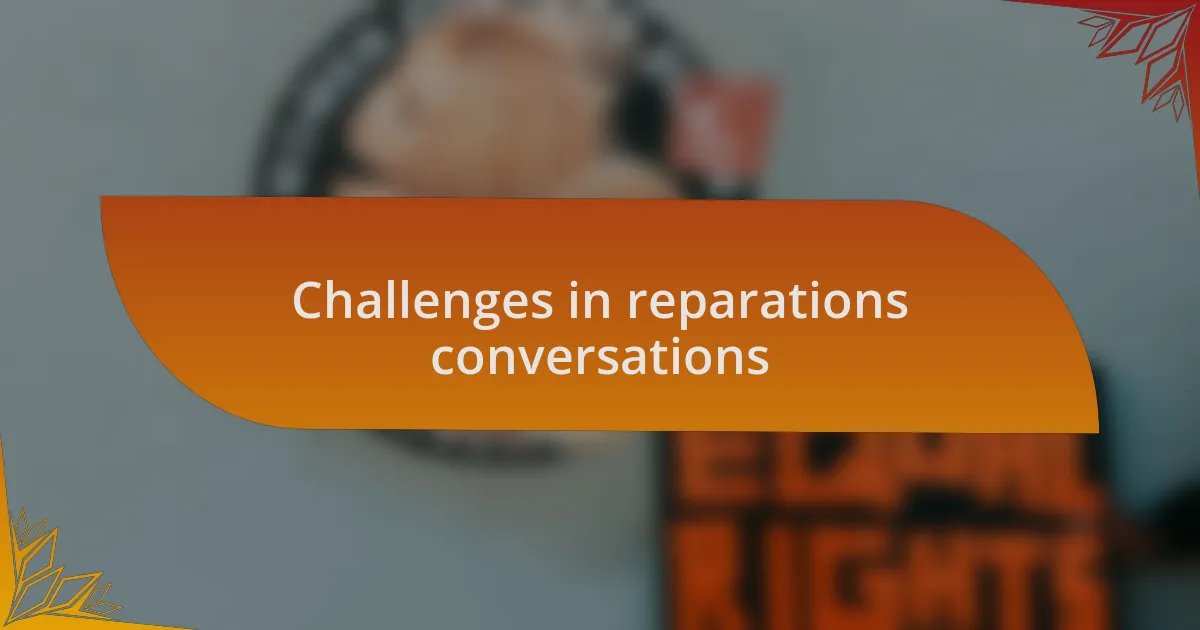
Challenges in reparations conversations
Engaging in conversations about reparations can be incredibly challenging due to the layers of historical trauma and differing perspectives involved. I remember a community meeting where a participant expressed deep anger over the reparations movement, viewing it as a reminder of unresolved pain rather than a pathway to healing. This moment made me realize how crucial it is to acknowledge these varied emotions; ignoring them only builds walls between conversations.
Another significant hurdle is the tendency for conversations to become polarized. I once facilitated a session where individuals split into opposing camps—those who favored monetary reparations versus those advocating for systemic change. The tension in the room was palpable. It struck me that when we become entrenched in our positions, we often miss opportunities to explore common ground. Have you ever found yourself so focused on defending your perspective that you overlook valuable insights from those with opposing views?
Lastly, the complexity of the reparations issue itself complicates discussions. For instance, during one dialogue, we debated who should be eligible for reparations. This intricate topic led to heated discussions, as many felt their voices were overlooked. I learned that establishing a framework for understanding can help clarify these debates, but it also requires patience and empathy from all involved. It’s tough to navigate; how do we even begin to define what reparations would look like in practice?
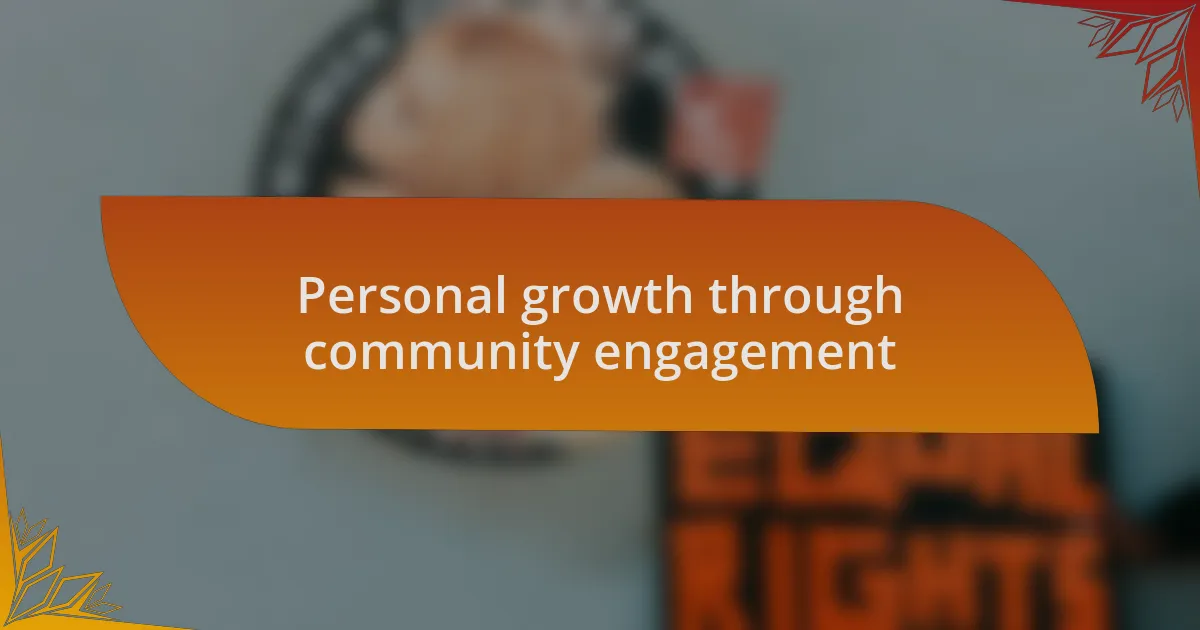
Personal growth through community engagement
Participating in community dialogues has profoundly influenced my personal growth in unexpected ways. I recall one instance during a workshop where we discussed the concept of restorative justice. Engaging with diverse perspectives, I found my preconceived notions challenged, nurturing a deeper empathy for others’ experiences. It made me recognize that personal growth often stems from listening, rather than speaking.
In another setting, I encountered an elder who faithfully shared stories of their ancestors, weaving lessons of resilience and hope. Listening to their experiences not only expanded my understanding of historical context but also ignited a passion within me to advocate for change actively. This interaction reinforced the notion that growth isn’t solely about acquiring knowledge; it’s about connecting with a shared history that propels us toward a more equitable future.
Moreover, my participation in roles that encourage dialogue has taught me the importance of vulnerability. I vividly remember sharing my own struggles related to systemic injustices during a discussion. At first, I was hesitant, fearing judgment, but the openness of the group transformed the atmosphere. Have you ever experienced that moment when sharing your truth creates a ripple effect of honesty? It was in that space that I realized true growth emerges when we allow ourselves to be seen and heard, fostering a culture of mutual respect and understanding.
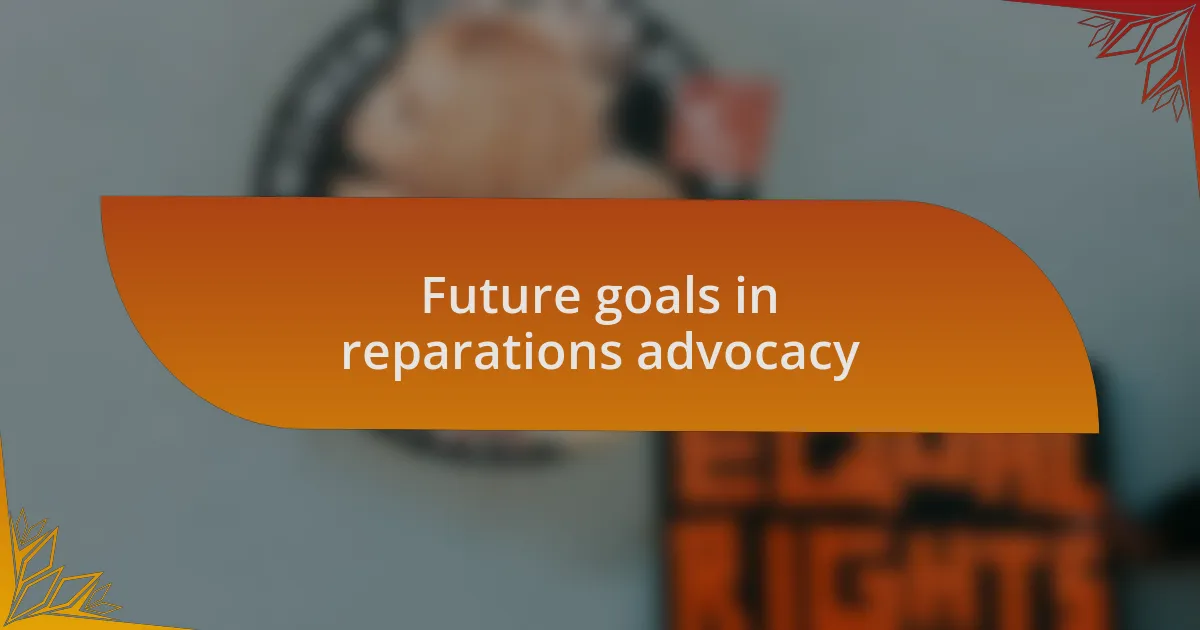
Future goals in reparations advocacy
The future of reparations advocacy hinges on establishing meaningful connections and building coalitions that amplify marginalized voices. I remember a meeting where various community leaders came together with differing agendas; instead of allowing our differences to divide us, we focused on shared goals, which sparked a powerful dialogue. Isn’t it fascinating how collective strength can reshape our approach and ignite real change?
Another key goal is to integrate educational initiatives into reparations advocacy. During a recent workshop, I witnessed firsthand how powerful knowledge can be. When participants learned about historical injustices, I saw their engagement shift from passive listening to passionate activism. Have you ever considered how much awareness can inspire action? This shows that a well-informed community is better equipped to push for reparative policies.
Lastly, creating measurable benchmarks for success is vital for the future of reparations advocacy. When I reflect on past discussions, I often think about how easy it is to get lost in the grass-roots rhetoric without clearly defined outcomes. By setting specific goals, it transforms our advocacy from idealistic visions to tangible results—essentially making our conversations count. How do we ensure that our voices are not just echoing in empty halls? We need to commit to accountability, making sure that actions align with our vision for justice and equality.